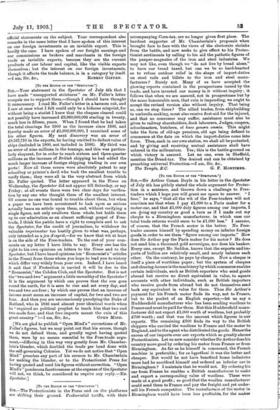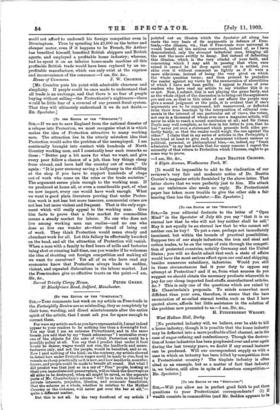[TO THE EDITOR OP THE "SPECTATOR1
Sin,—Sir Arthur Conan Doyle in his letter in the Spectator of July 4th has pithily stated the whole argument for Protec- tion in a sentence, and thrown down a challenge to Free- traders which I hope you will grant me space to answer. " I fear," he says, " that all the wit of the Free-traders will not convince me that when I pay £1,000 to a Paris maker for a motor-car, and that £1,000 duly figures among our imports, I am doing my country as good a turn as if I made out my cheque to a Birmingham manufacturer, in which case our total trade returns would seem to be £1,000 less." I assume, of course, that the French motor is the better. No Free- trader amuses himself by spending money on inferior foreign goods in order to see them " figure among our imports." How does Sir Arthur pay the Paris maker for his motor ? He does not send him a thousand gold sovereigns, nor does his banker. Every one, except Mr. Seddon, knows that the exports and im- ports of bullion are relatively small, and nearly balance each other. On the contrary, he pays by cheque. Now a cheque is itself a piece of worthless paper ; but the system of cheques and clearing-houses is the machinery by which commerce enables certain individuals, such as British exporters who send goods abroad but receive no direct equivalent in value, to square accounts with other individuals, such as British importers who receive goods from abroad but do not themselves send back any equivalent in value for them. Thus Sir Arthur's payment for his French motor finds its way, not to France, but to the pocket of an English exporter,—let us say a Huddersfield manufacturer who has been sending woollens to France and must be paid for them. But this Huddersfield manu- facturer did not export £1,000 worth of woollens, but probably £700 worth ; and that was the amount which figures in our exports. The remaining £300 finds its way to the British shippers who carried the woollens to France and the motor to England, and to the agent who distributed the goods. Hence the excess of our imports over our exports which so greatly alarms Protectionists. Let us now consider whether Sir Arthurdoes his country more good by ordering his motor from France or from Birmingham. As far as he himself is concerned, the French machine is preferable ; for ex hypothesi it was the better and cheaper. But would he not have benefited home industries more had he sacrificed himself and ordered an inferior car in Birmingham ? I maintain that he would not. By ordering bis car from France he enables a British manufacturer to make and export a corresponding value of woollens. These were made at a good profit ; so good that the woollen manufacturer could send them to France and pay the freight and yet under- sell his French competitor. The manufacture of the motor in Birmingham would have been less profitable, for the maker
oould not afford to undersell his foreign competitor even in Birmingham. Thus by spending his £1,000 on the better and cheaper motor, even if it happens to be French, Sir Arthur has benefited himself, benefited British shippers and British agents, and employed a profitable home industry; whereas, had he spent it on an inferior home-made machine all this profitable British trade would have been replaced by an un- profitable manufacture, which can only exist at the expense and inconvenience of the consumer.—I am, Sir, &c.,
[Mr. Crombie puts his point with admirable clearness and simplicity. If people could be once made to understand that all trade is an exchange, and that there is no fear of people buying without selling—the Protectionist's nightmare—there would be little fear of a reversal of our present fiscal system. That they will ultimately understand it we do not doubt.— ED. Spectator.]







































 Previous page
Previous page